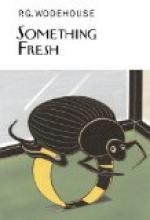“You mustn’t believe everything you see in the papers,” he said. “What are the stout children in the one-piece bathing suits supposed to be doing?”
“Those are Cupids, George, aiming at us with their little bow— a pretty and original idea.”
“Why Cupids?”
“Cupid is the god of love.”
“What has the god of love got to do with it?”
Aline placidly devoured a fried potato. “You’re simply trying to make me angry,” she said; “and I call it very mean of you. You know perfectly well how fatal it is to get angry at meals. It was eating while he was in a bad temper that ruined father’s digestion. George, that nice, fat carver is wheeling his truck this way. Flag him and make him give me some more of that mutton.”
George looked round him morosely.
“This,” he said, “is England—this restaurant, I mean. You don’t need to go any farther. Just take a good look at this place and you have seen the whole country and can go home again. You may judge a country by its meals. A people with imagination will eat with imagination. Look at the French; look at ourselves, The Englishman loathes imagination. He goes to a place like this and says: ’Don’t bother me to think. Here’s half a dollar. Give me food—any sort of food—until I tell you to stop.’ And that’s the principle on which he lives his life. ’Give me anything, and don’t bother me!’ That’s his motto.”
“If that was meant to apply to Freddie and me, I think you’re very rude. Do you mean that any girl would have done for him, so long as it was a girl?”
George Emerson showed a trace of confusion. Being honest with himself, he had to admit that he did not exactly know what he did mean—if he meant anything. That, he felt rather bitterly, was the worst of Aline. She would never let a fellow’s good things go purely as good things; she probed and questioned and spoiled the whole effect. He was quite sure that when he began to speak he had meant something, but what it was escaped him for the moment. He had been urged to the homily by the fact that at a neighboring table he had caught sight of a stout young Briton, with a red face, who reminded him of the Honorable Frederick Threepwood. He mentioned this to Aline.
“Do you see that fellow in the gray suit—I think he has been sleeping in it—at the table on your right? Look at the stodgy face. See the glassy eye. If that man sandbagged your Freddie and tied him up somewhere, and turned up at the church instead of him, can you honestly tell me you would know the difference? Come, now, wouldn’t you simply say, ’Why, Freddie, how natural you look!’ and go through the ceremony without a suspicion?”
“He isn’t a bit like Freddie.”
“My dear girl, there isn’t a man in this restaurant under the age of thirty who isn’t just like Freddie. All Englishmen look exactly alike, talk exactly alike, and think exactly alike.”




